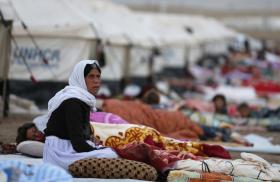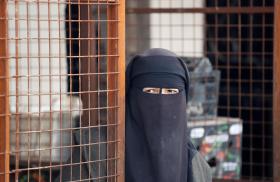
- Policy Analysis
- PolicyWatch 1348
U.S. Financial Pressure on Terrorists and Rogue Regimes

Part of a series: Counterterrorism Lecture Series
or see Part 1: U.S. Efforts against Terrorism Financing: A View from the Private Sector
How is the U.S. government applying its financial and economic tools to combat terrorism and rogue regimes?
On February 27, 2008, Patrick O'Brien addressed a Policy Forum at The Washington Institute. Assistant Secretary O'Brien heads the Treasury Department's Office of Terrorist Financing and Financial Crime (TFFC), a component of the Office of Terrorism and Financial Intelligence (TFI). The following is a rapporteur's summary of his remarks.
Read the full text of Assistant Secretary O'Brien's prepared speech.
New International Standards
TFI has focused its efforts on the mechanisms and industries particularly vulnerable to terrorism financing: cash couriers, trade-based systems, and charitable organizations. The current focus on illicit cash smuggling is illustrated by TFFC's close work with Immigration and Customs Enforcement (ICE) to promote transparency through improved disclosure requirements. The Financial Action Task Force (FATF), the Paris-based international standard-setting body for anti-money laundering/countering the financing of terrorism (AML/CFT) regimes, has also contributed by adopting new international norms and providing guidance for governments and the private sector. On trade-based systems, the TFFC is also working with ICE to facilitate transparency by proposing new standards for FATF. Lastly, on the issue of charities, TFFC has worked with the IRS to promote greater transparency through stronger reporting requirements for organizations seeking tax-exempt status.
Since the private sector is a critical partner in effectively implementing sanctions, the government has shared information with it in a variety of contexts, as exemplified by the Department of Homeland Security's cooperation with critical industries under threat. Although they are not required to do so, many banks use lists from Treasury's Office of Foreign Assets Control to help make sound judgments on their business activities. Institutions outside the United States are not legally obligated to enforce such regulations, but they too are always looking for more information to make good business decisions regarding their clientele. Currently, data from the Financial Crimes Enforcement Network (FinCen) indicates approximately 20 percent correlation between suspicious activity reports issued by banks and open FBI investigations, demonstrating the utility of such information. Continuing to share information and further improving these numbers is important to U.S. success in this matter.
Charitable organizations are also a critical partner in Treasury's outreach program. TFFC has led TFI's engagement with the charitable sector and developed the Anti-Terrorist Financing Guidelines: Voluntary Best Practices for U.S.-Based Charities. More broadly, TFFC has been a leader in developing a global approach (including through FATF) to combating terrorist exploitation of charities by developing international standards that strengthen oversight, enforcement, outreach, and engagement. Although the charitable sector remains a significant vulnerability, steps are being taken to expand and improve our capabilities.
The United States is most effective in combating terrorist support networks when it can act multilaterally. For example, around 2003, FATF developed the Non-Cooperative Countries and Territories (NCCT) process in which several nations were identified as having inferior AML/CFT regimes. Since then, FATF has helped several of these countries work their way off the list.
Iran and the Gulf
To date, various U.S. and multilateral efforts have facilitated the adoption of UN Security Council Resolutions 1737 and 1747 against Iran's nuclear and missile programs. Among other requirements, these resolutions obligate states to freeze the assets of named entities and individuals associated with those programs. Some criticize the effectiveness of the UN sanctions and claim they do more harm to innocent individuals than to the regime. To the contrary, innocent individuals are suffering more from the regime's macroeconomic mismanagement. Furthermore, the sanctions have tightened trade finance for Iranian entities and made it more difficult for Tehran to acquire highly specialized and very expensive equipment needed for a nuclear program.
It should be pointed out that the media misrepresented the recent FATF meeting in Paris as a bilateral meeting between Iran and the United States. FATF is an international body with more than thirty member countries, and the meeting took place under its auspices. FATF's primary role is to develop AML/CFT standards, and the purpose of the meeting was to discuss such issues.
Building cooperation in the Gulf has its challenges because of the longstanding ties between Gulf countries and Iran. Currently, Treasury seeks continued engagement with the region in addressing the challenges posed by Iran. Although Gulf countries have appropriate laws in place to counter terrorism financing, many of them do not enforce these laws consistently or effectively. Statements by Treasury Undersecretary Stuart Levey criticizing the Saudis have received considerable attention and are worth noting, given that Gulf countries remain primary sources of funding for al-Qaeda, the Taliban, and other radical Sunni groups. The kingdom has made key progress against terrorism and terrorism financing since it was last attacked in May 2003, but these efforts have focused on internal threats rather than activity outside the country.
Syria, Lebanon, and Islamic Financing
Using financial tools on Syria would be more challenging for two reasons: the United States has limited economic relations with Syria, and Syria is not fully integrated into the international financial system. Nevertheless, the United States can impact Syria through the private sector (e.g., the Treasury enforcement action targeting the Commercial Bank of Syria). And even though economic relations between the two countries are not strong, there is still value in attempting to use our existing tools. We will also continue to add to the international discussion on Syria because multilateral action remains the most effective route on that front.
Lebanon has made notable contributions against terrorism financing. In fact, the country's financial intelligence unit is one of the leaders in the region. But Lebanon's current political situation -- particularly the presidential impasse -- could seriously hamper the building of governmental institutions necessary for effective CFT efforts. As far as Hizballah, Treasury is doing its part to counter financing intended to help the organization.
It is important to note that sharia-compliant Islamic financing is an established practice that poses no inherent danger; simply being an Islamic bank does not constitute an immediate red flag. In addition, many Islamic banks participate in Treasury's private-sector outreach efforts.
This rapporteur's summary was prepared by Albar Sheikh.





